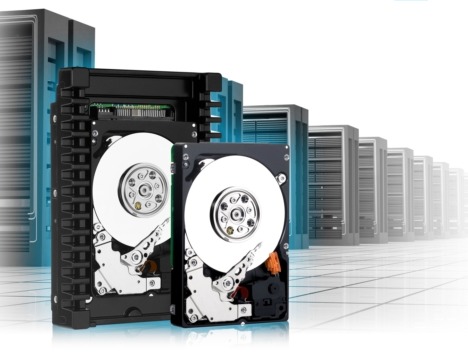WD Announces 10K RPM XE 3.5-inch SAS Hard Drives
WD has released a number of new SAS enterprise class 10K RPM drives.

Western Digital has announced the arrival of a number of new internal SAS drives. The drives feature a 10K RPM speed, and are actually 2.5" drives hidden in 3.5" casings.
The drives feature a Mean Time Between Failure (MTBF) of a massive two-million hours. According to WD, they should consume a lot less power than competing 3.5" 15K RPM drives while also being a lot more reliable. The drives should consume 67 percent less power than these competing drives.
"Delivering up to 50 percent higher capacity, similar or better maximum sequential performance, higher reliability and up to 67 percent lower power consumption versus 3.5-inch, 15,000 RPM drives, the new WD XE drives are the answer for data center server and storage solutions needing a transition strategy. IT managers now have a worry-free migration path to the latest enterprise performance drives from WD, while preserving their chassis and solution investments," said Rich Rutledge, senior VP of WD's Datacenters Business Unit.
The drives will come in sizes ranging from 300 GB to 900 GB, with respective MSRP pricing of $299.99 to $599.99. The WD XE SAS Enterprise drives will ship with a five-year limited manufacturer warranty.
Get Tom's Hardware's best news and in-depth reviews, straight to your inbox.
Niels Broekhuijsen is a Contributing Writer for Tom's Hardware US. He reviews cases, water cooling and pc builds.
-
warmon6 Reply10703705 said:What the point in this drive when we have ssd.
Because not every situation make sense to use an SSD in.
Data centers that do cloud storage for the general public for example would not benefit greatly from an SSD for a number of reasons:
1. Because everyone that's is accessing these drives is probably not using some insane Fiber Internet connection to upload/download there stuff, You would not see the speed benefit of the drive.
2. Cloud need storage capacity. An SSD achilles heel.
3. IT managers need hard core reliably. While I'm not saying the SSD are not reliable (I've had an Samsung 830 for over a year now), SSD just haven't been around long enough that all IT people can trust yet for their particular situation.
SSD have only became big in the past 4 to 5 years vs the HDD 30+ years (I know that SSD been around longer than that but nobody really herd to much about them till 2007/08 time frame).
About the only benefit a Data center would see right off the bat with an SSD would be the power bill.
-
jossrik As far as SSDs VS HDDs, gotta remember these HDDs are not consumer grade, they're meant to run 24/7 for years reliably. The SSDs that compete with these for MTBF are still pretty expensive for relatively small amounts of data.Reply -
alidan Reply10703756 said:Because SSD's are no where near cost effective in a business environment.
looking at a 240gb ssd on newegg that is enterprise quality that is at the 1$ per gb range, beating out the 300gb option on price performance by a large margin. the 900 gb... not so much
10703972 said:As far as SSDs VS HDDs, gotta remember these HDDs are not consumer grade, they're meant to run 24/7 for years reliably. The SSDs that compete with these for MTBF are still pretty expensive for relatively small amounts of data.
right here
http://www.newegg.com/Product/Product.aspx?Item=N82E16820178433
10705478 said:An MTBF of 2 M hours ? Does it make sense ? One failure every 228 years ?
they run a crap ton of drives, and than see how long they run for before a failure happens,
its their way of saying how rare or expected a failure should be. -
tenchinage yep, but seeing how fast my SSD broke down, I'm not sure this is the tech I'd choose for storing my business data...Reply -
anonymous_user So these drives are almost like the Velociraptor drives but with a SAS interface?Reply -
game junky SAS and SCSI will always be a primary for SAN deployments - Issue at this point is that SAN manufacturers control the type of drive able to be deployed in their units because they put custom firmware on the drives. If they could increase shelf life on the consumer grade drives that have killer speed and reliability (a la the Samsung 840 Pros or Intel 520s) then consumers/businesses wouldn't be handcuffed to crazy SAS/SCSI prices. EMC - I am looking at you. Either decrease bloated configuration prices for drives or hire US customer service reps, I am not the only customer considering walking away from the table. You have excellent products, but you're becoming Apple-ish with your pricing structure.Reply
